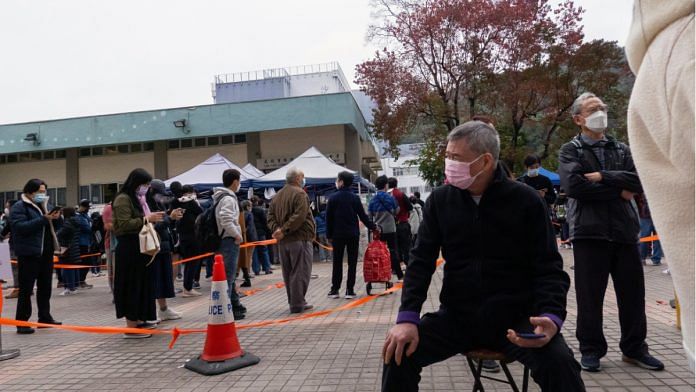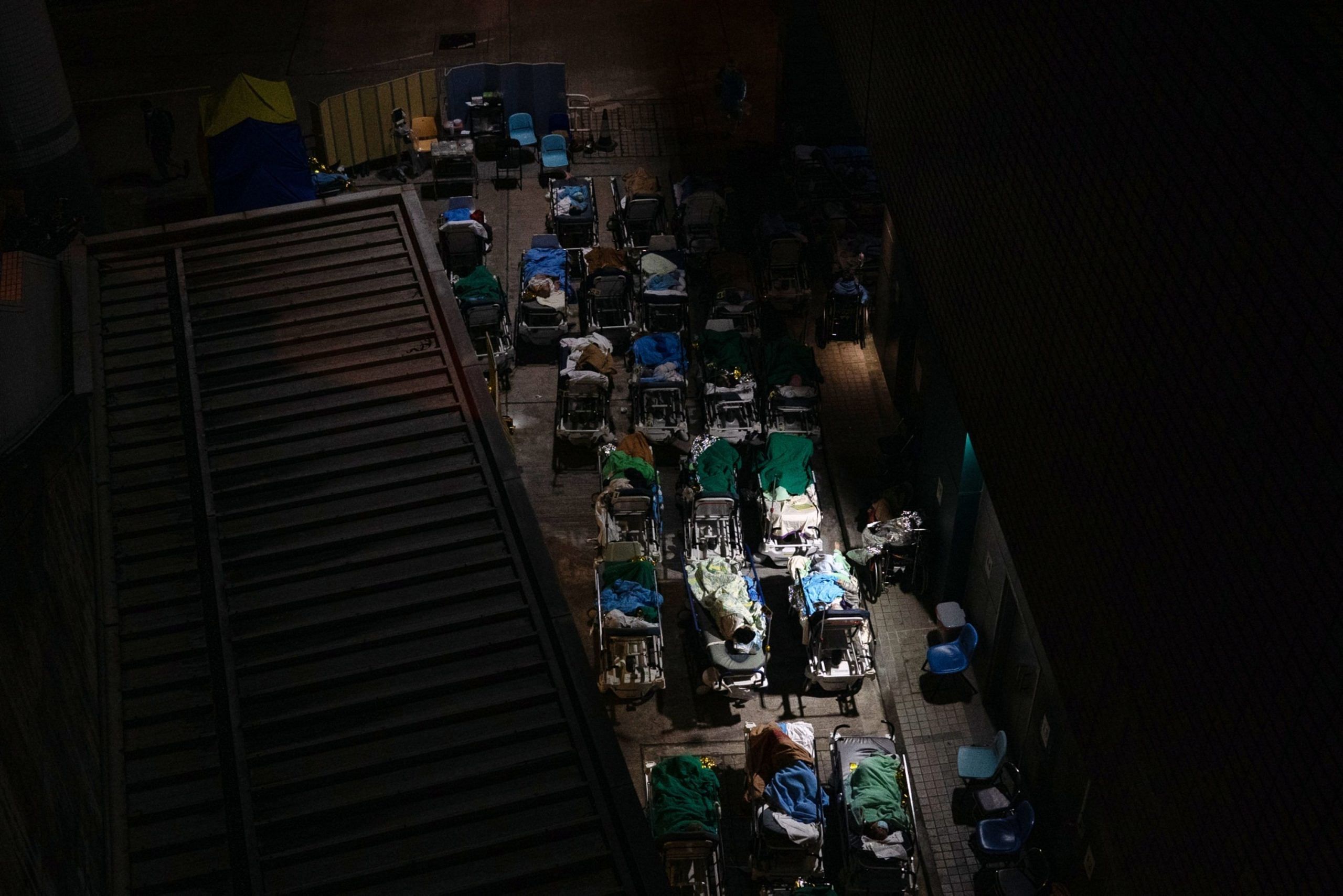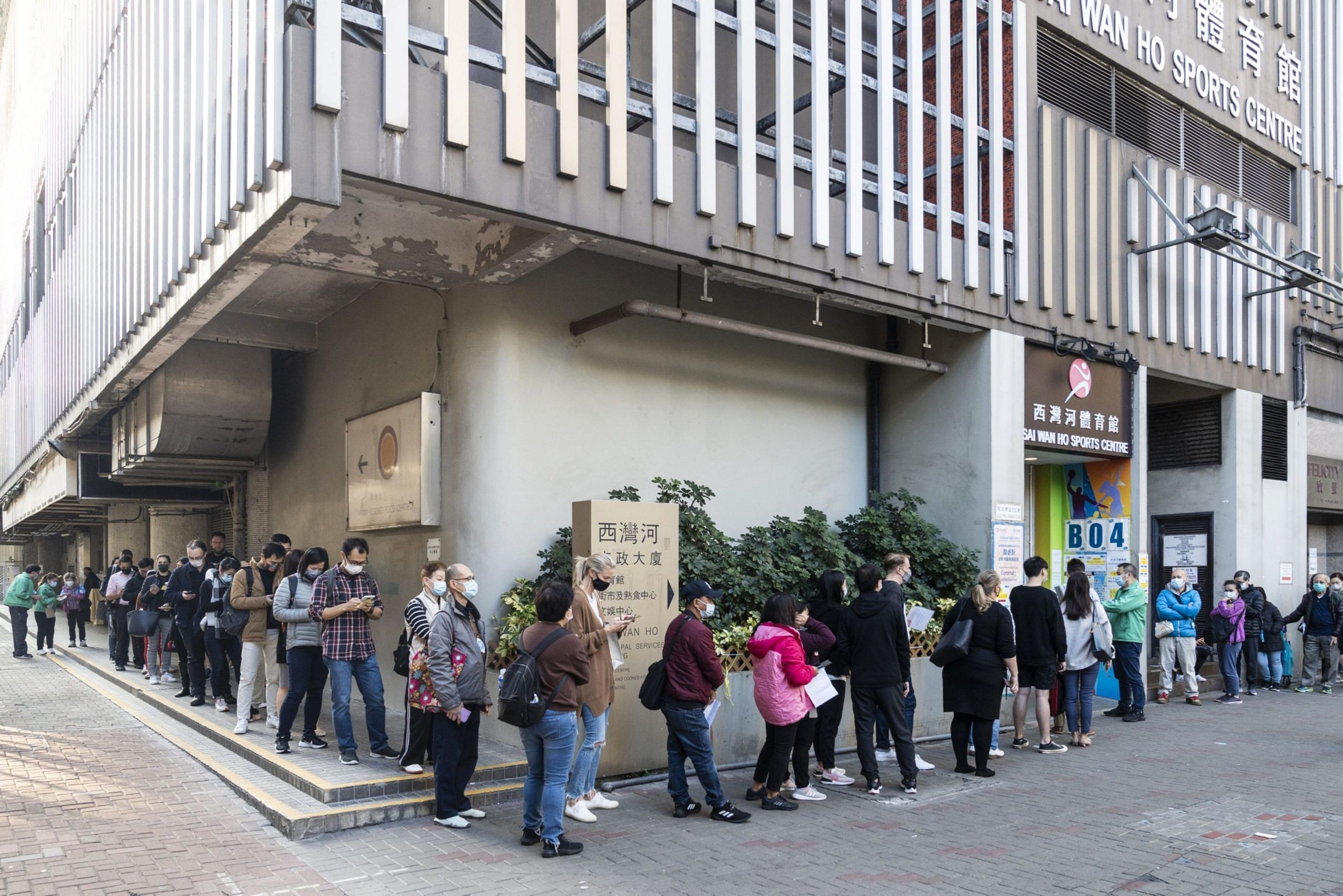
Deaths in Hong Kong’s worst ever Covid-19 outbreak are forecast to spiral, with experts predicting a wave of fatalities among the city’s under-inoculated and vaccine hesitant elderly population.
Only 43% of seniors who are 80 or over have received even one dose, according to government data. While that’s up from 22% in early January, it still isn’t enough to protect the segment of the population most at risk, according to Karen Grepin, an associate professor in the school of public health at the University of Hong Kong. Elderly patients have already made up the majority of the 311 deaths in this outbreak so far.
“Even doubling of a small number is still a small number,” Grepin said. “There are still unvaccinated people in nursing homes and that is just a ticking time bomb.”

In the current wave, Hong Kong could have nearly 100 deaths a day in late-March and a total of around 3,200 by mid-May, according to a new report from the university’s researchers released on Tuesday. An overwhelming majority of those deaths is likely to be among the elderly.
With hospitals overflowing and unable to take in more patients, local nursing home operators are warning of the danger of Covid-positive seniors seeding widespread outbreaks.
Facilities don’t have the staff, equipment or space to cope with any infected residents, the Elderly Services Association of Hong Kong said in a Feb. 18 statement that called on the government to find other places to house asymptomatic elderly. Infected people on-site “could lead to an imminent crisis in residential homes,” the association said.
The worry is well-founded, given the experience in other countries.
In the U.S., Covid fatalities among unvaccinated people 80 and older were nearly seven times higher than for vaccinated seniors in the same age group, the Centers for Disease Control and Prevention said.
Medical conditions
Hong Kong’s government launched its vaccination program in early 2021 but failed to persuade most seniors, who worried about reports of side effects or were complacent given the city’s low incidence of Covid cases.
The government encouraged people with existing medical conditions to consult first with their doctors before getting vaccinated, and many risk-averse physicians advised patients to wait.
As the months went by and the elderly vaccination program stalled, officials urged patience, saying seniors would eventually come around to the idea of getting shots. During that time, Hong Kong didn’t make much progress in preparing the additional quarantine facilities, isolation wards or hospital capacity the elderly would need once Covid pierced the city’s defenses.

“We were basically buying time to get our most vulnerable sectors of the population vaccinated and we failed to do that,” said Grepin.
That is putting the city at greater risk of deaths compared to other places that prioritized vaccinating the elderly first and have had more success in takeup.
While the number of cases in South Korea has been soaring, the fatality rate is falling, dropping to just to 0.38% on Feb. 20, compared to 0.88% a month ago. That’s thanks largely to the success in the vaccination effort: Among South Koreans 60 and older, 88% have received third shots. Even countries like the U.S. and the U.K. prioritized vaccinating the elderly first, given their vulnerability.
The experience of Hong Kong’s major rival as an Asian financial hub, Singapore, shows how vulnerable a health-care system can be to an influx of older Covid patients. People 70 and above account for more than half of hospitalizations and about 70% of patients on supplemental oxygen in Singapore.
Mass vaccination has prevented more deaths. Singapore has vaccinated about 95% of its seniors, and as a result is averaging fewer than 5 deaths per day so far this month.
Adding to the risk in Hong Kong, many seniors getting their first vaccines are choosing less effective shots made by China’s Sinovac Biotech Ltd. rather than the messenger RNA vaccines from BioNTech SE which have been found to provide more protection against the omicron variant.
Also read: Queen Elizabeth shows how to make Boris Johnson’s ‘Living With Covid’ plan work
Eliminating cases
Even as experts call for a renewed campaign to deliver shots, Chief Executive Carrie Lam’s government may divert resources away from vaccination efforts and instead toward implementing the sort of city-wide mass testing that Beijing has used in mainland cities to eliminate outbreaks.
“Of the resources available, you should just go all-out for vaccination,” said Jean Woo, director of the CUHK Jockey Club Institute of Ageing at the Chinese University of Hong Kong.
Mass testing can even make things worse, she said, by forcing older people to spend hours outdoors and in queues while waiting for their turn.
“There’s nowhere for them to sit,” Woo said. “It’s cold. It increases the risk of cross-infection.”
Hong Kong’s adherence to the Covid Zero strategy has pushed the health-care system to the brink, with Hong Kongers shocked by videos on social media of elderly patients lying on gurneys outdoors while waiting for overstretched hospitals to treat them.
China and Hong Kong won’t tolerate a significant number of elderly deaths caused by Covid in the city and Hong Kong should stick to the “dynamic zero” policy, Chinese top epidemiologist Zhong Nanshan was cited as saying by media including HK01 and Sing Tao on Tuesday.
Elderly patients infected with the coronavirus should be getting speedy intervention with therapeutics like remdesivir, a drug that requires an IV injection, but the crisis in the hospitals makes that extremely difficult, said Siddharth Sridhar, a clinical assistant professor of microbiology at the University of Hong Kong.
“Where are they going to get it? Who is going to give it to them?” he said, adding that short-staffed hospitals are facing problems finding enough doctors and nurses. –Bloomberg
Also read: Xi Jinping scores some diplomatic wins for China as polarising Beijing Winter Olympics end

COMMENTS